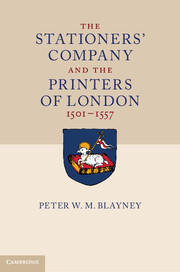Book contents
- Frontmatter
- Dedication
- Contents
- List of illustrations
- Preface
- Acknowledgements
- Permissions
- Conventions
- List of abbreviations
- 1 1357–1500
- 2 1501–1509
- 3 1510–1520
- 4 1521–1528
- 5 1529–1534
- 6 1535–1541
- 7 1535–1541
- 8 1542–1546
- Endnotes to Volume I
- 9 1547–1553
- 10 1553–1557
- 11 1554–1557
- 12 1501–1557
- APPENDIXES
- Bibliography
- Index of STC numbers
- General index
- References
1 - 1357–1500
Historical and lexical introduction
Published online by Cambridge University Press: 05 November 2014
- Frontmatter
- Dedication
- Contents
- List of illustrations
- Preface
- Acknowledgements
- Permissions
- Conventions
- List of abbreviations
- 1 1357–1500
- 2 1501–1509
- 3 1510–1520
- 4 1521–1528
- 5 1529–1534
- 6 1535–1541
- 7 1535–1541
- 8 1542–1546
- Endnotes to Volume I
- 9 1547–1553
- 10 1553–1557
- 11 1554–1557
- 12 1501–1557
- APPENDIXES
- Bibliography
- Index of STC numbers
- General index
- References
Summary
Prehistory, 1357
By the middle of the fourteenth century, most members of the London book trades belonged to one or other of three recognized craft companies or misteries. Many today would call those misteries ‘guilds’ (or ‘gilds’), and in other cities they might have been guilds. But in late medieval London the words mistery and guild were not synonymous, and the three craft associations in question were misteries as distinct from guilds. How and when they first gained formal recognition is uncertain. None of them had been incorporated by royal charter, so each probably achieved official existence when the City permitted its members to assemble, to elect governing officers, and to make rules. But it is unclear whether that permission was individually conferred on each craft by a formal act of foundation, or whether the City's relationship with the members of those and other unincorporated trades simply evolved.
Arguably the most important of those misteries was the one least closely related to the book trade as such. Its members sometimes wrote texts to be bound up in codex form, sometimes wrote in ready-bound codices, and sometimes wrote documents that were called ‘books’ even though they were not codices at all. But what distinguished the Scriveners or Writers of Court Letter (scriptores litterae curialis) from London's other writers was their focus on legal documents, including indentures, bonds, deeds, and contracts of all kinds. Some Scriveners specialized in conveyancing, others in composing petitions or drawing up wills. Some became sworn notaries; others preferred accountancy, and were hired by organizations that needed skilled clerks to keep the books. Although the word scrivener was sometimes used as an unspecialized synonym for writer and might thus be applied to any professional penman, by the fifteenth century its primary meaning was much the same as modern solicitor, and it denoted a writer of legal deeds as distinct from other kinds of manuscript.
- Type
- Chapter
- Information
- Publisher: Cambridge University PressPrint publication year: 2013



